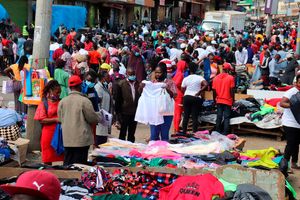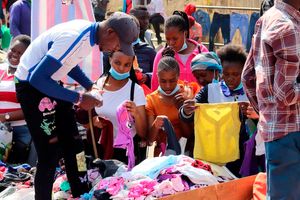
From left: Annette Wabala, Brian Nyanbura, Dennis Njai and Mary Adeng Akot at Gikomba Market in Nairobi on February 27, 2025.
Nairobi’s Gikomba Market is chaotic. Intimidating. The populations are huge, and people walk in different directions. The routes to reach the shoe or fish seller are like walking through veins and arteries.
Nothing is within easy reach, yet the shoes, carpets, utensils, or clothes are affordable, unique, and sometimes designer, meaning that those who have mastered Gikomba, a market for second-hand things and foodstuffs, get them at a bargain.
In a harsh economy where the cost of living has gone up, and people are looking for cheaper goods, a young crop of Kenyans have created jobs for themselves.
From 4am, you meet at an agreed location, you pay them Sh1,500 to Sh5,000 to show you the arteries of Gikomba.
Annette Wabala, 24, is one of them.
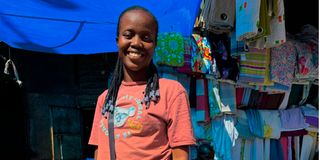
Annette Wabala at Gikomba Market on February 25, 2025, where she runs a guided thrift shopping business.
“I started by selling thrifted clothes, posting videos showing where and how I sourced items from Gikomba, and soon after, people began asking me to take them there,” she tells Nation Lifestyle.
Known as “Wabala” on social media, she entered the world of thrifting to save money and build a small business. Over time, her expertise in navigating the throbbing Gikomba market became a valuable service to others.
Her clientele? People looking to refresh their wardrobes to business owners restocking inventories.
“I have two packages—one for Sh1,500 for regular shopping and Sh2,000 for those with longer lists or looking for speciality items like shoes,” she says, adding that dresses and shoes are particularly popular items among her clients, most of whom are women.
However, she does not turn male clients away. She refers them to her colleagues who specialise in men’s thrift items.
She has built a loyal clientele primarily through social media platforms like TikTok, where she shares snippets of her thrifting tours, market experiences, and shopping finds.
“I get most of my clients from TikTok. Anytime I take a client to the market, I post content about what we sourced, the budget, and how the day went. This has helped me attract new customers,” she says.
Apart from TikTok, Wabala relies on referrals from clients.
“Clients who have had a good experience with me refer their friends, family, or even business associates,” she says.
So how much does she make in a month?
Between Sh50,000 and Sh100,000 monthly, and to meet the increasing demand, she has employed two other guides.
So, what makes Gikomba such a popular destination for thrift shoppers? Wabala believes it is the variety and affordability.
“There’s a wide selection of items—more than 10 vendors for dresses, several for bags. The diversity of options and the quality make it appealing to shoppers,” she says. Additionally, in recent years, second-hand clothes have gained a new level of popularity, with people increasingly seeking unique, timeless pieces.
“Most people don’t want to wear what everyone else is wearing. Second-hand clothes provide that uniqueness,” she adds.
As she reflects on the future of her business, Wabala sees plenty of growth opportunities. “We live in an era where convenience is highly prioritised. People are willing to pay for services that save them time and effort. I think this business will continue to grow because there’s a gap in the market,” she says.
Her advice for anyone looking to start a similar service is simple: “Get familiar with the market. It’s important to know not only the routes and paths but also the vendors because they are the people you’ll interact with daily,” she says, “the more the sellers know your face, the easier it is for them to help you find what you need.”
Boots, corsets
Brian Nyambura is a fashion enthusiast who has turned into an entrepreneur. Known by his TikTok handle “Nash”, he has been operating in the busy lanes of Gikomba for two years now.
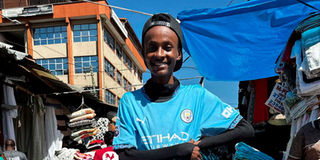
Brian Nyambura, popularly known as ‘Nash,’ during one of his thrifting sessions at Gikomba Market on February 27, 2025.
“I started by posting videos about Gikomba on TikTok—where to find the best deals, how much money you need, and tips for navigating the market,” says the 22-year-old.
Soon after, Brian’s TikTok followers began reaching out for more than advice—they wanted him to guide them through the market in person.
“People were watching my videos and asking if I could take them around the market. That’s when I realised I could turn this into a business,” he says.
Brian now charges Sh2,000 per day for his services, which include guiding clients through Gikomba and helping them shop.
“Most of my clients are looking for boots, heels, and corsets,” he says.
His client base is diverse, ranging from Kenyans to tourists.
“Some tourists just want to experience Gikomba,” he says.
His services are not limited to in-person guiding either. He also sources items for clients who are unable to visit the market themselves.
Sh100,000
While the business has seen steady growth, it has not been without its challenges. One of the biggest hurdles Brian faces is managing clients’ expectations.
“Some clients show up without a clear idea of what they want or come with high expectations but a low budget. They think my taste is enough to guide them, but it helps if they have some idea of what they’re looking for,” he says.
There is also a common misconception that Gikomba is a place where everything is dirt cheap.
“Most items are affordable and of good quality, but not at throwaway prices,” Wabala adds.
With his peers competing for eyeballs from TikTok, how does Brian stand out?
“In this industry, everyone has their own clients. I don’t see it as competition because there’s enough market for everyone,” he says, “I love thrifting, and I think I’ll be doing this for a long time. It’s profitable and sustainable.”
On a good day, he can make Sh6,000. “It all depends on the number of customers I’m having,” he says. “If I have three clients in a day, I’ll go home with Sh4,500.”
So how much does he make in a month? Between Sh70,000 and Sh100,000, he says.
For Brian, a university student pursuing business management, this aligns with his course. “In five years, I still see myself in the same position because it’s all about managing businesses, so at least I can employ myself,” he says.
Somalia, South Sudan
Dennis, known as “Saluka” on TikTok, started the thrifting journey when he was in high school.
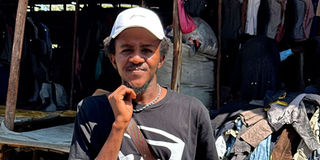
“I brought my cousin to Gikomba once, and she offered to pay me. That’s when I realised I could turn this into a business,” he says.
He also charges between Sh1,500 and Sh2,000, depending on the size of the order and the time it takes.
“Some brokers at the market sell you items at inflated prices. I help clients avoid that and get better deals,” says the 21-year-old.
More than 95 percent of his clients are women, but this business is not limited to Nairobi residents.
“Thanks to social media, I get clients from South Sudan, Tanzania, and Somalia,” he says.
He also has clients from Mombasa, Wajir, and Kisumu, eager to experience the thrill of thrifting in Gikomba.
“A Mombasa customer took a train to Nairobi, and I helped her shop in Gikomba. Another flew from Kisumu to come to Gikomba,” he says, adding, “they want branded items like NFL, Adidas, and Nike clothing, often at a fraction of the retail price.”
Dennis believes there is still plenty of room for growth. “I’m trying to major in shopping for business people who cannot come to the market other than just bringing shoppers,” he says.
Teach resilience
If there is one thing that Gikomba has taught Mary Adeng Akot is resilience. Known as Vicky on TikTok, the 24-year-old South Sudanese living in Nairobi guides clients from various regions, including Mombasa and South Sudan.
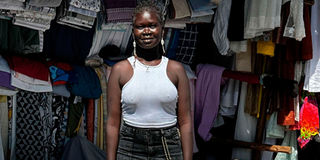
Mary Adeng Akot, a South Sudanese national, at Gikomba Market on February 27, 2025, where she helps customers find trendy second-hand items.
“Gikomba is huge, and even people who have been there before can get lost,” says Mary, who has been at it for two years now.
She too charges Sh2,000 per client.
“Most of my clients are women between 23 and 30 years old. They usually look for boots and fur jackets, which are fashionable now,” she says.
One of the tricks she has had to master is bargaining with sellers on behalf of her clients. “But if I bargain too hard, the sellers might refuse to sell to me next time,” she says.
She also deals with online requests, where clients describe what they need; she sends them photos of available items, and they pay.
Looking ahead, Mary has big plans. She envisions opening a shop in the next two or three years, where she can manage her business and hire someone to handle the market guiding.
“In the future, I’ll just sit like a boss,” she says with a smile.


